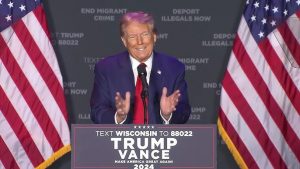In a landscape where media monopolies and foreign influences hold sway over public discourse and communications, an urgent call to action has emerged. At the heart of the issue lies the alleged National Crime Syndicate — a shadowy network reportedly orchestrated by legal and media insiders Gloria Allred and Anthony Pellicano. This syndicate, entangled with foreign actors like Saudi Crown Prince Mohammed bin Salman (MBS), is accused of manipulating narratives, judicial processes, and even the country's broadcasting systems.
Whistleblower Jaguar Wright has unveiled the inner workings of this network, claiming the use of psychological manipulation to control figures across entertainment, law, and politics. Concerning evidence points to a pivotal 1999 Democratic National Committee meeting at AT&T, where these control tactics were reportedly discussed, implicating AT&T in the media manipulation.
Further alarm arises from collusions between foreign powers and U.S. media, such as a deal between MBS and Hollywood's Joel Silver. This illustrates a growing threat: international investments allegedly shaping narratives to shield culpable actions, undermining independent journalism and, subsequently, national sovereignty.
Media giants Disney, Universal, Fox, and CBS are suspected of compromising U.S. national security by selling broadcast spectrum to foreign entities. This scenario enables nations such as China, Russia, and Saudi Arabia to influence American communications infrastructure, risking both security and the integrity of public broadcasting.
In response, a plan to reclaim control has been proposed: revoking the licenses of these media conglomerates, probing the syndicate's operations, and banning technologies like ATSC 3.0 that enable external manipulation of media channels. Moreover, breaking up monopolies and reinforcing independent journalism are key strategies envisioned to liberate the airwaves from undue influence.
With the stakes high, and as shadowy dealings threaten the pillars of American democracy, the call to action demands unity and vigilant pursuit of transparency, reminding citizens that reclaiming these channels is fundamental to preserving democracy and freedom. The moment calls for activism and a rigorous demand for legislative measures against the monopolization of media and communication systems.
Whistleblower Jaguar Wright has unveiled the inner workings of this network, claiming the use of psychological manipulation to control figures across entertainment, law, and politics. Concerning evidence points to a pivotal 1999 Democratic National Committee meeting at AT&T, where these control tactics were reportedly discussed, implicating AT&T in the media manipulation.
Further alarm arises from collusions between foreign powers and U.S. media, such as a deal between MBS and Hollywood's Joel Silver. This illustrates a growing threat: international investments allegedly shaping narratives to shield culpable actions, undermining independent journalism and, subsequently, national sovereignty.
Media giants Disney, Universal, Fox, and CBS are suspected of compromising U.S. national security by selling broadcast spectrum to foreign entities. This scenario enables nations such as China, Russia, and Saudi Arabia to influence American communications infrastructure, risking both security and the integrity of public broadcasting.
In response, a plan to reclaim control has been proposed: revoking the licenses of these media conglomerates, probing the syndicate's operations, and banning technologies like ATSC 3.0 that enable external manipulation of media channels. Moreover, breaking up monopolies and reinforcing independent journalism are key strategies envisioned to liberate the airwaves from undue influence.
With the stakes high, and as shadowy dealings threaten the pillars of American democracy, the call to action demands unity and vigilant pursuit of transparency, reminding citizens that reclaiming these channels is fundamental to preserving democracy and freedom. The moment calls for activism and a rigorous demand for legislative measures against the monopolization of media and communication systems.





















